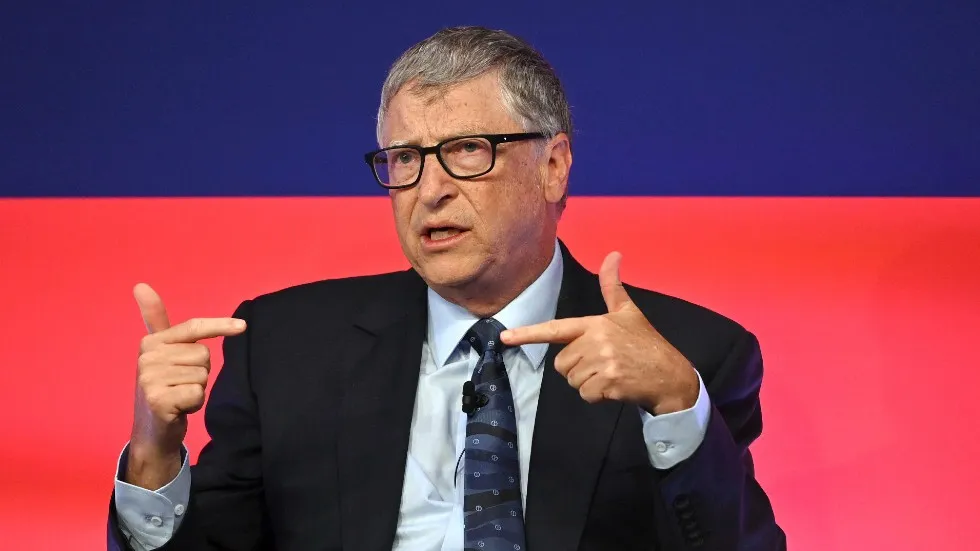Содержание
As one of the world’s most influential figures in philanthropy and technology, Bill Gates continues to play a significant role in shaping global policy conversations. His involvement in politically charged topics, from public health and education to clean energy and pandemic preparedness, has raised questions about where he stands on the U.S. political spectrum.
Though not a politician, Gates’s philanthropic activities and public commentary often intersect with government policy, prompting many to wonder: Is Bill Gates a Democrat or Republican? His work through the Bill & Melinda Gates Foundation frequently aligns with progressive goals, yet he supports free-market innovation and occasionally backs Republican initiatives.
This article deeply examines Gates’s public statements, donation records, and policy positions to determine how his political identity truly takes shape. Rather than fitting neatly into one party, Gates favors practical, solution-oriented approaches over strict ideological alignment, making his political profile complex and compelling.
Is Bill Gates a Democrat or Republican?
He is not officially affiliated with either party but tends to support policies and causes that lean moderate to liberal.
Bill Gates’s Public Statements and Political Identity
Although Bill Gates refrains from identifying with a specific political party, his public remarks and actions reveal much about his ideological stance. In interviews, he frequently underscores the importance of science-based policymaking, innovation, and global collaboration—values often associated with centrist or progressive politics. He has expressed support for taxing the wealthy, expanding vaccine access, and investing in sustainable energy solutions.
At the same time, Gates doesn’t shy away from criticizing inefficient government spending or overly complex regulations, views that align more closely with conservative fiscal principles. This blend of perspectives suggests a practical, results-driven approach rather than rigid partisanship. His political outlook reflects a belief in policy grounded in data and real-world outcomes.
Interestingly, personal values often intersect with public viewpoints. For example, topics like education and gender equality—championed by Bill Gates Daughter, Jennifer Gates—reveal a generational commitment to humanitarian progress. Gates’s nonpartisan collaborations with multiple administrations further illustrate his dedication to solution-oriented governance.
Ultimately, Gates’s political identity is rooted in pragmatism. He focuses on scalable, evidence-backed initiatives rather than engaging in party loyalty or ideological extremes.
Political Donations and Campaign Contributions
Bill Gates’s political contributions offer a revealing look into his values and policy preferences. While not overtly partisan, his donation history reflects a strategic and balanced approach to political engagement.
Democratic Campaign Support
Bill Gates has consistently supported Democratic campaigns over the years, particularly those advocating for public health initiatives, climate action, and educational reform. His donation history reveals a strong alignment with candidates who prioritize science-based solutions and global development. These contributions reflect his broader philanthropic focus on equity, access to healthcare, and long-term sustainability.
Republican Donations and Bipartisanship
Although less frequent, Gates has also made donations to Republican candidates, particularly those with moderate platforms or a focus on innovation and economic growth. This willingness to cross party lines suggests a strategic approach rather than ideological loyalty. Gates appears to value competence and results, regardless of political affiliation.
Bill & Melinda Gates Foundation Influence
While the Bill & Melinda Gates Foundation is a nonprofit and does not fund political campaigns, its investments in global health, education, and clean energy often align with progressive policy goals. The foundation’s influence on public policy is substantial, shaping agendas on a global scale.
PACs and Super PACs Connections
Gates has generally distanced himself from highly partisan political action committees. Instead, he has shown indirect support for moderate and bipartisan groups that emphasize innovation, technological advancement, and effective governance.
Financial Transparency and Reporting
All of Gates’s political contributions are documented through the Federal Election Commission (FEC), offering a clear picture of his financial engagement. While his donations lean Democratic, the pattern illustrates a thoughtful, issues-based approach to political support rather than blind party allegiance.
Areas Where Gates’s Views Align Politically
Bill Gates’s public positions on key social and economic issues often reflect a mix of centrist and progressive values. His views align with Democratic policies on several major topics, although they are driven more by data and practicality than political identity.
- Climate Change and Renewable Energy: Gates has long advocated investment in clean energy technology to combat climate change. Through his initiatives like Breakthrough Energy, he supports policies that reduce carbon emissions and accelerate the global shift toward sustainable energy.
- Public Health and Vaccination: Improving global health is a cornerstone of Gates’s philanthropy. He is a vocal supporter of vaccine equity and pandemic preparedness, aligning with policies prioritizing science and international cooperation.
- Education Reform: Gates has pushed for educational improvements in the U.S., especially in underserved communities. His focus on K–12 system reforms and increasing digital access aligns with many progressive education agendas.
- Technology and Innovation Policy: While supportive of innovation and market growth, Gates believes in responsible regulation to prevent monopolistic practices, particularly in Big Tech.
- Tax Policy: Gates has openly supported higher taxation on the wealthy and advocated for fairer economic systems. His stance closely mirrors progressive calls for tax reform to reduce income inequality.
How Gates’s Politics Compare to Other Tech Billionaires
Bill Gates’s political positioning contrasts with several of his peers in the tech industry. Unlike Elon Musk or Peter Thiel, who have boldly endorsed Republican figures and libertarian ideals, Gates maintains a centrist and pragmatic stance. His views closely resemble Jeff Bezos or Tim Cook, who support Democratic social policies while championing free-market principles.
Gates avoids public political spats and rarely uses social media for controversial commentary. Instead, he emphasizes diplomacy, scientific progress, and global cooperation. His influence stems more from his philanthropic legacy than political declarations. Platforms like Celeb Digs may spotlight his lifestyle and fame, but Gates’s public image is defined by his long-term investments in global health, education, and climate change.
This measured, policy-focused approach has helped him earn bipartisan respect. It reflects a commitment to lasting impact over short-term political gains or ideological extremes.
Is Bill Gates a Democrat or Republican? A Pragmatic Profile
Bill Gates’s political behavior defies simple party labels. Rather than aligning strictly with Democrats or Republicans, his actions reflect a policy-focused mindset aimed at solving complex global problems. Below are key aspects of his pragmatic political identity:
- A Policy-Driven, Not Party-Driven, Identity: Gates consistently emphasizes practical, evidence-based solutions over ideological loyalty. Whether discussing climate change, global health, or tax reform, his stance is shaped by data, not party affiliation.
- Collaboration Across Political Divides: Throughout his public career, Gates has worked alongside leaders from both major U.S. parties. His focus on results and shared goals allows him to form partnerships that transcend partisan boundaries.
- Consistent Focus on Global Issues: Regardless of the prevailing political climate, public health, education, and sustainability have remained at the core of Gates’s efforts. His initiatives reflect long-term, global thinking rather than domestic political cycles.
- Avoidance of Partisan Rhetoric: Gates rarely engages in political mudslinging or divisive commentary. He prefers diplomacy and expert-driven dialogue, focusing on progress rather than polarization.
- Influence Without Official Affiliation: Despite his significant impact on policy discussions, Gates is not officially tied to any political party. His influence stems from philanthropy, research, and advocacy, underscoring a unique and pragmatic role in shaping public discourse without formal political ties.
In Closing
Labeling Bill Gates as strictly Democrat or Republican oversimplifies his complex political identity. While many of his priorities—like global health, climate change, and wealth taxation—closely mirror Democratic values, his approach is rooted more in practicality than party lines. Gates consistently champions science-driven, scalable solutions that transcend traditional political boundaries.
His track record of donating to Democratic candidates is balanced by his willingness to support Republican leaders when their goals align with his mission. Instead of promoting ideology, Gates focuses on results and long-term impact. Ultimately, his political footprint reflects a modern, data-informed mindset shaped by global citizenship, innovation, and a deep commitment to solving real-world problems beyond partisan divides.
FAQ’s
Is Bill Gates officially a Democrat or Republican?
No, Gates is not officially affiliated with either political party. He supports a range of policies across both Democratic and Republican lines, depending on the issue and evidence behind it.
What political causes does Bill Gates support?
Gates is an advocate for global public health, climate change action, K–12 education reform, and fairer economic systems—often favoring higher taxes on the ultra-wealthy to reduce inequality.
Has Gates donated to both parties?
Yes, while most of his contributions go to Democratic candidates, he has also backed moderate Republicans and bipartisan initiatives that align with his policy goals and philanthropic mission.
Does the Gates Foundation engage in politics?
The foundation does not donate to political campaigns, but it funds global programs and policy research that significantly influence health, education, and sustainability at a government level.
How does Gates compare politically to other tech billionaires?
Compared to outspoken tech figures like Elon Musk or Peter Thiel, Gates takes a more centrist and data-driven approach, focusing on policy impact rather than public political endorsements.
Why is Gates seen as a political influencer?
Through high-impact philanthropy and public advocacy, Gates shapes global conversations on key issues like vaccines, education, and climate without holding any official political office.

